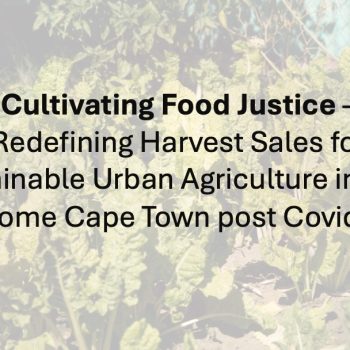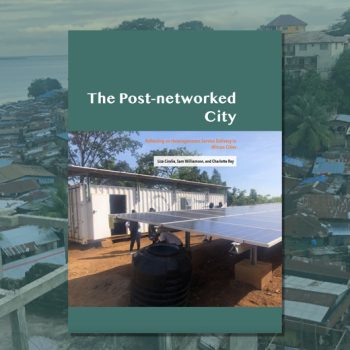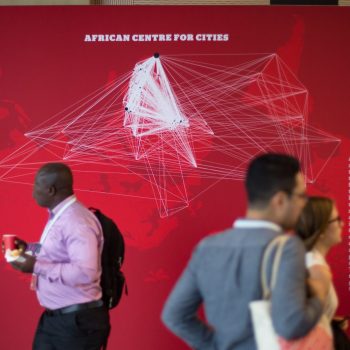AfriFOODlinks
AfriFOODlinks envisions a thriving network of cities in Africa and beyond, in which food systems and nutrition are firmly established on the local governance agenda. Citizen-led multi-stakeholder governance platforms welcome diverse voices to inform policy and urban planning processes that promote food and nutrition security and environmentally regenerative practices.
Launched in December 2022, AfriFOODlinks is an EU funded project. Coordinated by ICLEI Africa, the project gathers 26 partners across the globe to improve food security and urban sustainability in 65+ cities in Africa and Europe by:
- Applying an urban food systems lens to promote shifts to healthy, sustainable diets
- Transforming urban food environments through real-world socio-technical experiments
- Promoting inclusive multi-actor governance to empower public officials, small businesses and communities with ownership and agency to shape their food systems
- Accelerating innovative, women- and youth-led agri-food businesses to support local value addition and inclusive economic participation
AfriFOODlinks sees 3 drivers of the urban food environment’s form, function and dynamics:
Infrastructure
Shapes the way in which food is produced, processed, transported and arrives at the consumer, how it is purchased, stored, prepared and consumed. The form of infrastructure has direct implications for food quality and safety, greenhouse gas emissions, loss and waste, and consumer behaviours.
Social and cultural preference
Drives many of the food choices by residents and is influenced by education on sustainable healthy diets and nutrition, cultural and religious norms and by marketing and advertising present in urban environments.
Business innovation
Shapes preferences through new retail and food experiences and applies both to formal and informal businesses, both of which display a form of flexibility not currently possible in government bureaucracies. It also contributes to increasing the local availability of diverse, improved food products.
PROJECT VALUES
AfriFOODlinks is consciously framed around a particular set of values, as so much of the food we are eating is a legacy of an extractive colonial history that was based on a particular form of economy. It deliberately looks toward African knowledge to shift the multiple ways in which cities function.
The project’s LINCS value framework is about reframing how our societies and economies work, activated by engagements with food, as food is deeply values-oriented, representing humanity, culture, aspirations, celebration and society. The name LINCS reminds us of one of the project’s central themes: the need to build more and stronger linkages in cities. LINCS represents systems thinking: by understanding the causal relationships between elements in a system, we can better understand the overarching system behaviours, and target our interventions at these.
We make use of Adinkra symbols of the Akan peoples in West Africa for each value. These are aligned with the symbol’s meaning or essence.
Learning
The project stresses the value of experiential learning and that multiple ways of knowing are welcomed, deemed of equal value, and can be connected to enhance understanding. “NEA ONNIM NO SUA A, OHU” – “He who does not know can know from learning”
Inclusivity
Inclusivity and deliberate engagement and empowerment of communities will enhance their agency and participation in decision-making for a people-centred and informed research, policy and practice. “FUNTUNFUNEFU-DENKYEMFUNEFU” – “Unity in diversity”
Sustainability
Sustainability is articulated both as the overarching global imperative to ensure economic, environmental and social wellbeing, and as the ethos that every project intervention must aim to become self-sustaining. “SANKOFA”- The backwards turning bird symbolises returning while looking forward.
Novelty
Represents the embracing of the new or unexpected, which necessarily requires diverse expertise, skills and perspectives. It includes the dismantling of inappropriate systems in favour of traditional or indigenous practices. “UAC NKANEA” – “UAC lights” symbolises technological advancement.
Collaboration
To successfully ensure transdisciplinary work, societal actors must be continuously engaged to co-define the research objectives and questions, and to continuously contribute to meaning-making with the researcher as the research progresses. “BOA ME NA ME MMOA WO” – “Help me and let me help you”.
PROJECT LOCATIONS
Cape Town, Kisumu, Mbale, Ouagadougou, Tunis, Arusha, Antananarivo, Quelimane, Dakar, Lusaka, Niamey, Windhoek, Tamale, Bukavu, Rabat, Barcelona, Vienna, Milan, Montpellier, Bruges
Programme details
ACRA, APHRC, Agence de Financement et de Promotion des Petites et Moyennes Entreprises, Agence du Développement Économique Urbain, CIRAD, Centre for Food Policy, City, University of London, Comune di Milano – MUFPP, Institut de Recherche en Sciences Appliquées et Technologie, ESta, Food Rights Alliance, Hivos, ICLEI, ICLEI Europe, Inades-Formation Burkina, Institut de Recherche pour le Développement (IRD), Institut National de Nutrition et de Technologie Alimentaire (INNTA), Jaramogi Oginga Odinga University of Science and Technology, Oribi, RSR, Rikolto, SHONA, SA Urban Food & Farming Trust, UNESCO Chair in World Food Systems and L’Institut Agro, University of Ghana, Women in Sustainable Enterprise
European Union


